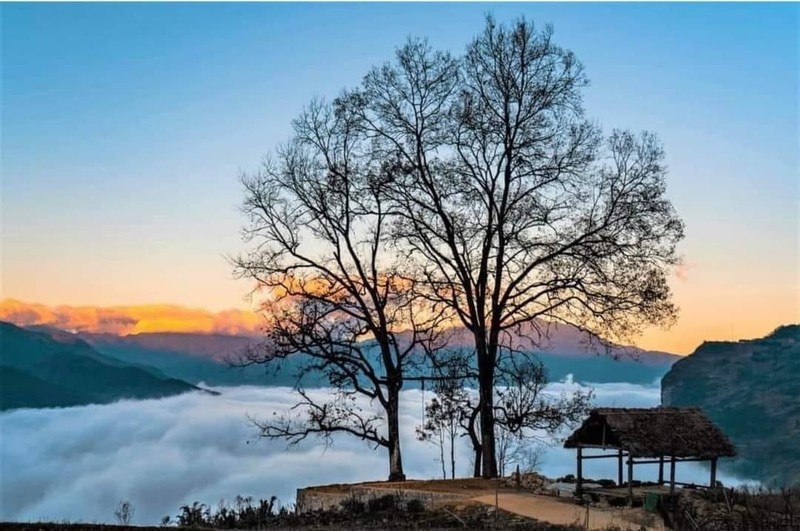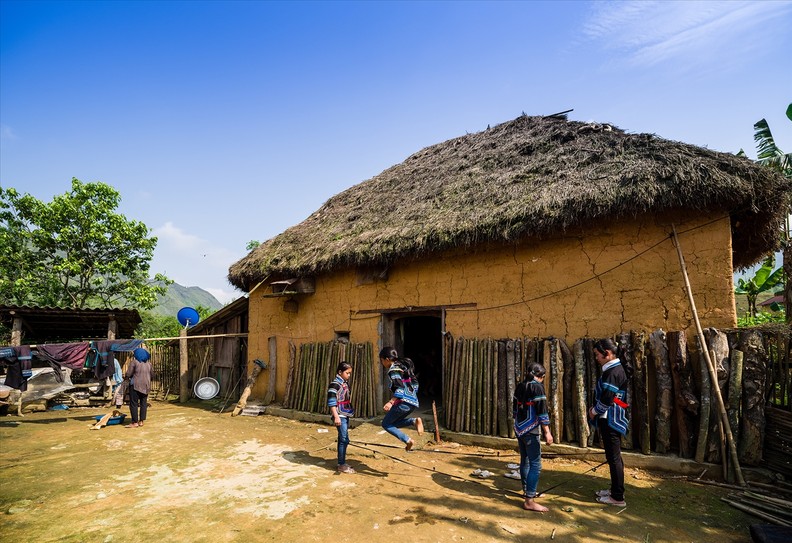Tourists to Y Ty commune, Bat Xat district, in northern Lao Cai province should not miss a visit to Choan Then village, which is dubbed as “a village in the cloud”, as it is submerged in a sea of floating clouds all year round.

A popular check-in place in Choan Then is two “happy" chestnut trees (Photo: baodantoc.vn)
Unique village of Ha Nhi ethnic group
Located 100km from the centre of Bat Xat district, Choan Then village is the living place of the black Ha Nhi ethnic group. The village is home to 57 households with a total population of 323 people, of which about 98% are Ha Nhi people.
Sitting at an altitude of about 2,000m above sea level and leaning against the Nhiu Co San mountain range, Choan Then is blanketed in a sea of clouds most of the year, making its nickname “the village in the clouds”.
In Choan Then, Ha Nhi people live in ‘trinh tuong’ (earthen) houses, which are built in square or rectangular shapes, with their roofs tiled with thatch. Each house usually has only one door in the middle and two arched windows on the side, which helps to keep the owners warm in winter and cool in summer.
In the yard of each house, the owners often grow a few peach trees and flowers along the fence. In the spring, the whole village bursts with the vibrant colours of blooming flowers.
Walking around Choan Then village, visitors will see children playing on swings, which hang under the trees while old women, dressed in traditional costumes, brush their white hair with a gentle smile.
At the end of the village, visitors can enter Choan Then Cultural Park, which impressed tourists with its vast space of overlapping mountains and hills.
On the sunny days of the rice ripening season, terraced fields look like a golden stream flowing down the valley. Meanwhile, on winter days, the fields look like a fairyland with a sea of clouds floating around.
A popular check-in place in Choan Then is two “happy chestnut trees”, which are about 30m high each. Standing side by side, the branches of the trees knit together, as if they are holding hands.
Not far away from the trees is a thatched hut, where children play, and women sell agricultural products to tourists.
Choan Then Park is also the place to host the villagers’ two biggest festivals of the year, namely the Ga Ma Thu (village’s worshipping) ceremony in the first lunar month and the Kho Gia Gia (rice-worshipping) festival in the sixth lunar month. During the festivals, villagers gather together to play folk games and enjoy buffalo-made dishes.

Children playing in front of a 'trinh tuong' house (Photo: baodantoc.vn)
Integrating tourism development with cultural preservation
In June 2021, the Lao Cai provincial authorities recognised Choan Then village as a tourist destination, which opened the opportunity to turn Choan Then into a community-based tourism village.
With support from the Australian-funded Gender Responsive Equitable Agriculture and Tourism (GREAT) programme, a community-based tourism team owned by Ha Nhi women was established in Choan Then village. Under the programme, the team members have received training on community-based tourism. In addition, the Choan Then community-based tourism house (CBT House) was also inaugurated, and 34 local households have been upgraded.
According to Ly Xa Go, a member of the team, after participating in training classes, she and her teammates as well as the villagers have been equipped with increased awareness of preserving and protecting the natural landscape, environment and cultural identity of their ethnic group.
Many families have invested money to renovate their houses into homestays, with certificated services to welcome guests.
To date, in addition to Choan Then CBT House, four other homestays have been established, with an average monthly income of 15 million VND per household.
Choan Then villagers have also held the importance of safeguarding their traditional ‘trinh tuong’ houses, as well as costumes, cuisine and traditional crafts such as rattan weaving, wine-making, and brocade embroidering.
Folk games, festivals, folklore songs and dances of the Ha Nhi ethnic group have been preserved and promoted, particularly the art of playing the ‘ho to’- a unique musical instrument of the Ha Nhi people.
With its favourable natural conditions, unique culture and the determination of the authorities and people, it is believed that Choan Then will soon become a magnetic tourist destination in Y Ty commune.
Bao Khanh - Translated by NDO